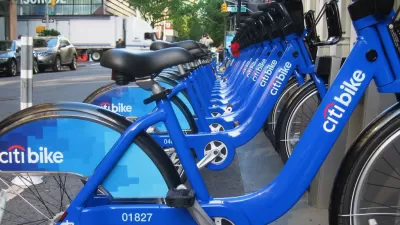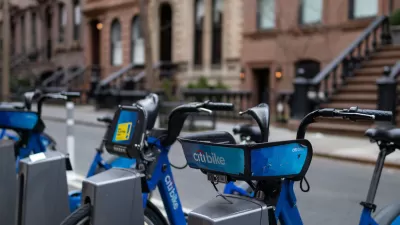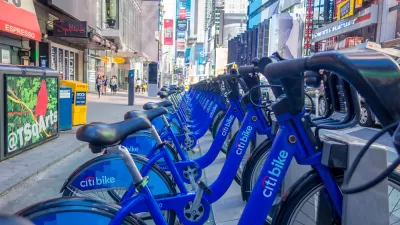In New York, SNAP recipients to get access to Citi Bikes at discount like DIVY riders already do in Chicago.

As bike share becomes more common around the United States, programs are looking for ways to get low-income riders involved by subsidizing their rides. "On July 17, Citi Bike announced a partnership with Healthfirst, a local health insurance provider, to offer discounted Citi Bike memberships for SNAP recipients in New York City," Eillie Anzilotti writes for Fast Company. Citi Bikes, which, along with a number of other bike share programs, was recently bought by Lyft, hopes the subsidized memberships will bring in riders who might not have wanted to spend the $169 it normally costs to rent a bike for a year.
Subsidies for bike share are already in place in cities around the country, including Chicago where SNAP recipients are already eligible for $5-per-month memberships. "In 2016, Capitol Bikeshare in Washington, D.C. began offering $5 annual memberships for residents that received services through a collection of community organizations, like Back on My Feet, a nonprofit that combines running with homeless services, and Jubilee Jobs, an employment services program," Anzilotti writes.
Still, price is not the only hurdle low-income bike share users face. Docks for bike shares are often concentrated in richer areas, also there's the matter of finding out about available discounted rates. Those who don't know about these programs may be paying more than they need to or not considering bike share at all.
FULL STORY: New York’s new discounted bikeshare is the next step toward equity

Planetizen Federal Action Tracker
A weekly monitor of how Trump’s orders and actions are impacting planners and planning in America.

Maui's Vacation Rental Debate Turns Ugly
Verbal attacks, misinformation campaigns and fistfights plague a high-stakes debate to convert thousands of vacation rentals into long-term housing.

Restaurant Patios Were a Pandemic Win — Why Were They so Hard to Keep?
Social distancing requirements and changes in travel patterns prompted cities to pilot new uses for street and sidewalk space. Then it got complicated.

In California Battle of Housing vs. Environment, Housing Just Won
A new state law significantly limits the power of CEQA, an environmental review law that served as a powerful tool for blocking new development.

Boulder Eliminates Parking Minimums Citywide
Officials estimate the cost of building a single underground parking space at up to $100,000.

Orange County, Florida Adopts Largest US “Sprawl Repair” Code
The ‘Orange Code’ seeks to rectify decades of sprawl-inducing, car-oriented development.
Urban Design for Planners 1: Software Tools
This six-course series explores essential urban design concepts using open source software and equips planners with the tools they need to participate fully in the urban design process.
Planning for Universal Design
Learn the tools for implementing Universal Design in planning regulations.
Heyer Gruel & Associates PA
JM Goldson LLC
Custer County Colorado
City of Camden Redevelopment Agency
City of Astoria
Transportation Research & Education Center (TREC) at Portland State University
Jefferson Parish Government
Camden Redevelopment Agency
City of Claremont





























